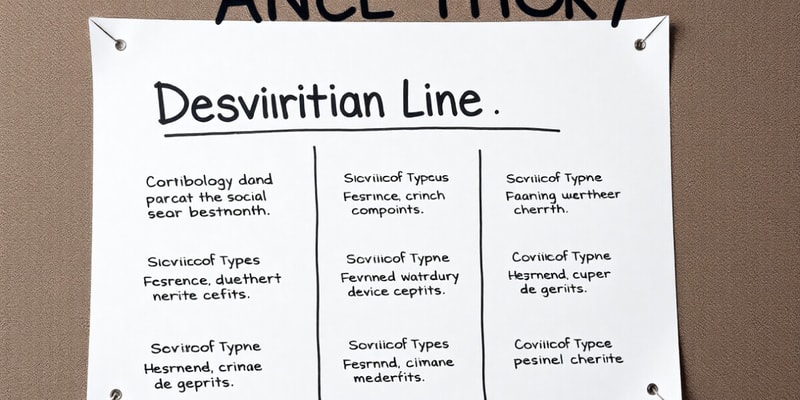Podcast
Questions and Answers
Which of the following is an example of secondary deviance?
Which of the following is an example of secondary deviance?
What does strain theory primarily analyze?
What does strain theory primarily analyze?
What is the primary difference between a violent crime and a hate crime?
What is the primary difference between a violent crime and a hate crime?
Which type of sanction is an award for academic achievements?
Which type of sanction is an award for academic achievements?
Signup and view all the answers
What does differential association theory suggest?
What does differential association theory suggest?
Signup and view all the answers
What motivates most hate crimes?
What motivates most hate crimes?
Signup and view all the answers
Who studied the concept of the power elite and its influence on society?
Who studied the concept of the power elite and its influence on society?
Signup and view all the answers
Which branch of the U.S. Criminal Justice System is responsible for enforcing laws?
Which branch of the U.S. Criminal Justice System is responsible for enforcing laws?
Signup and view all the answers
How does Emile Durkheim view the role of deviance in society?
How does Emile Durkheim view the role of deviance in society?
Signup and view all the answers
What is the relationship defined by the Labeling Theory?
What is the relationship defined by the Labeling Theory?
Signup and view all the answers
Which type of crime likely has the most victims per act?
Which type of crime likely has the most victims per act?
Signup and view all the answers
Which of the following is NOT a type of social control?
Which of the following is NOT a type of social control?
Signup and view all the answers
According to Strain Theory, what typically leads to increased deviant behavior?
According to Strain Theory, what typically leads to increased deviant behavior?
Signup and view all the answers
What is an example of a negative formal sanction?
What is an example of a negative formal sanction?
Signup and view all the answers
What factors do differential association theory emphasize on the development of deviant behavior?
What factors do differential association theory emphasize on the development of deviant behavior?
Signup and view all the answers
How many individuals fall victim to hate crimes in the United States each year, according to the data?
How many individuals fall victim to hate crimes in the United States each year, according to the data?
Signup and view all the answers
Study Notes
Key Definitions
- Social Control: Mechanisms used to regulate behavior and enforce societal norms.
- Strain Theory: Explores the disconnect between culturally accepted goals and legitimate means to achieve them.
- Secondary Deviance: Refers to deviant acts committed after an individual has been labeled as a criminal.
- Crime: Actions that breach legal statutes and can lead to punishment.
- Deviance: Actions or behaviors that contravene cultural values or societal norms.
Important Concepts
- Examples of Deviance: Include serious acts like murder, theft, drug trafficking, and the use of violence or intimidation.
-
Differences in Crime Types:
- Violent crime involves physical harm to another person.
- Hate crime is motivated by prejudice against a person's identity, such as religion or race.
- Functionalist View (Emile Durkheim): Deviance is seen as an essential aspect of society that can encourage re-evaluation of existing norms.
Theories and Associations
- Differential Association Theory: Argues that deviant behavior is learned through relationships. The likelihood of engaging in such behavior increases with exposure to deviant individuals.
Types of Sanctions
- Positive Formal Sanction: E.g., receiving an award for academic excellence.
- Positive Informal Sanction: E.g., receiving a compliment for a job well done.
- Negative Formal Sanction: E.g., punishment like detention for skipping school.
- Negative Informal Sanction: E.g., a parent giving a disapproving look.
Key Theorists
- C. Wright Mills: Known for studying the concept of the "power elite" and its influence on societal structures.
Criminal Justice System
- Three Branches: Comprised of police, courts, and corrections.
Labeling Theory
- Proposes that society's labels can lead individuals to identify with those labels. For example, being labeled a criminal may lead to further deviance.
Crime Statistics and Motivations
- Most Victimized Crime: Corporate crimes inflict harm on the most individuals during incidents.
- Deviance vs. Crime: Deviance does not always equate to criminal behavior.
- Hate Crime Statistics: Approximately 195,000 Americans fall victim to hate crimes annually, primarily motivated by religious intolerance.
Key Sociologists
- The theory focuses on contributions from E. Sutherland, T. Hirschi, Robert Merton, and C. Shaw & H. McKay.
Key Definitions
- Social Control: Mechanisms used to regulate behavior and enforce societal norms.
- Strain Theory: Explores the disconnect between culturally accepted goals and legitimate means to achieve them.
- Secondary Deviance: Refers to deviant acts committed after an individual has been labeled as a criminal.
- Crime: Actions that breach legal statutes and can lead to punishment.
- Deviance: Actions or behaviors that contravene cultural values or societal norms.
Important Concepts
- Examples of Deviance: Include serious acts like murder, theft, drug trafficking, and the use of violence or intimidation.
-
Differences in Crime Types:
- Violent crime involves physical harm to another person.
- Hate crime is motivated by prejudice against a person's identity, such as religion or race.
- Functionalist View (Emile Durkheim): Deviance is seen as an essential aspect of society that can encourage re-evaluation of existing norms.
Theories and Associations
- Differential Association Theory: Argues that deviant behavior is learned through relationships. The likelihood of engaging in such behavior increases with exposure to deviant individuals.
Types of Sanctions
- Positive Formal Sanction: E.g., receiving an award for academic excellence.
- Positive Informal Sanction: E.g., receiving a compliment for a job well done.
- Negative Formal Sanction: E.g., punishment like detention for skipping school.
- Negative Informal Sanction: E.g., a parent giving a disapproving look.
Key Theorists
- C. Wright Mills: Known for studying the concept of the "power elite" and its influence on societal structures.
Criminal Justice System
- Three Branches: Comprised of police, courts, and corrections.
Labeling Theory
- Proposes that society's labels can lead individuals to identify with those labels. For example, being labeled a criminal may lead to further deviance.
Crime Statistics and Motivations
- Most Victimized Crime: Corporate crimes inflict harm on the most individuals during incidents.
- Deviance vs. Crime: Deviance does not always equate to criminal behavior.
- Hate Crime Statistics: Approximately 195,000 Americans fall victim to hate crimes annually, primarily motivated by religious intolerance.
Key Sociologists
- The theory focuses on contributions from E. Sutherland, T. Hirschi, Robert Merton, and C. Shaw & H. McKay.
Studying That Suits You
Use AI to generate personalized quizzes and flashcards to suit your learning preferences.
Description
Explore key definitions and important concepts related to deviance and crime in this sociology quiz. Understand social control mechanisms, strain theory, and the functionalist perspective on deviance. Test your knowledge on the differences between crime types and examples of deviant behavior.



